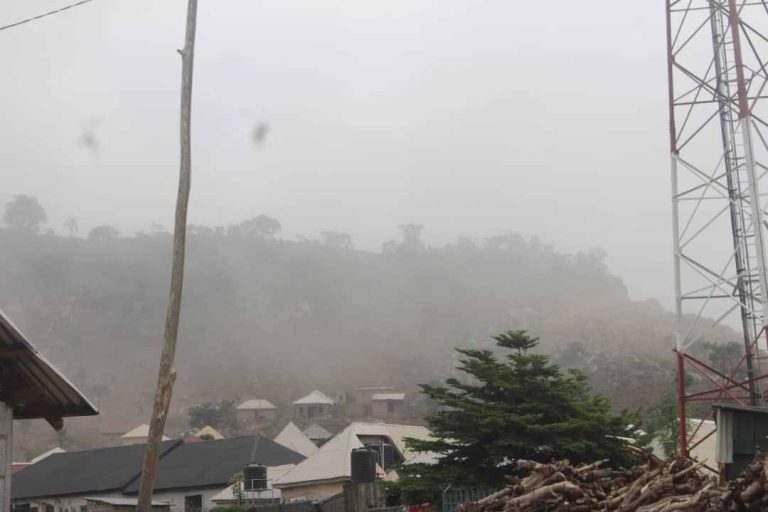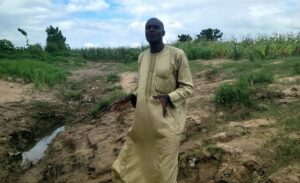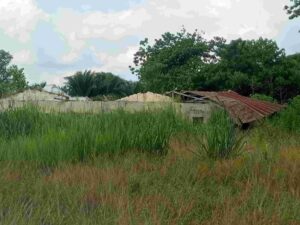In this concluding second part of a two-part report, Adedokun Theophilus details the multi-billion-naira revenue being raked in by Turkish and Chinese mining companies degrading host communities in the FCT, trampling on their rights and causing health challenges for residents. The report notes the apparent indifference of regulatory authorities to these abuses and violations of Nigeria’s extant environmental laws and regulations as it also sought the views of experts on the inherent regulatory lapses.
Read the first part here.
Big blast, big revenue
A DETAILED report of Zeberced, Venus, and Istanbul Quarries’ yearly revenues does not exist. Both the websites of the quarries and the platforms of government organisations lack these reports.
Similarly, relevant stakeholders and agencies contacted denied the availability of the annual reports of Zeberced, Venus, and Istanbul Quarries. Based on the information provided by NEITI, Zeberced ranked fourth in Nigeria in terms of solid mineral production volume behind Dangote Industries, BUA Cements PLC and Lafarge PLC in 2021.
The dearth of these revenue documents and data, however, prompted this reporter to go undercover to ascertain these numbers.
Disguised as an academic researcher, the reporter spoke with authorities of the Association of Granite Suppliers in the three quarries to unravel the figures. The number only covered the high trucks and lorries registered under this association. This means trucks from independent contracting firms and construction companies are not involved in this analysis.
The Abuja Gravel Supplier of Istanbul chapter employs over a thousand trucks, according to an interview with Ogah David, the branch’s association’s head.

These granite carriers’ range is based on the number of tonnes that can be conveyed at once. The specific number of each type of truck is unknown.
The average tonnes of granite conveyed by the smallest truck is expected to be 10 for six tyres; 10 tyres (small bucket) weigh between 10 and 25 tonnes; 10 tyres (Howo) weigh between 10 and 40 tonnes; and 12 tyres weigh between 12 and 35 tonnes.
Each truck transports granite at least twice or thrice a day, according to the officials. This means that every truck under the association carries an average of 10 tonnes, which is the minimum quantity of granites required from each driver. This is due to the lack of data to determine the number of each type of vehicle.

According to representatives from the Venus Mining Company chapter, there were 200 to 300 registered vehicles used for quarry operations. As he introduced himself, Mr Yusuf emphasised that earlier inquiries about the precise number of vehicles under their branch had led to misunderstandings among the association’s executives, while a driver in Zeberced Quarry, who identified himself as Ibrahim, claimed that the carrier ranged between 600-700. A tonne of granite in these communities is sold between N6,000 and N7,000.
Calculations from the interviews with Abuja Gravel Supplier Association’s executives and drivers show that Istanbul sells an average of 20,000 tonnes of granite daily, while Venus and Zeberced sell 4,000 tonnes and 12,000 tonnes of granite respectively.

Accordingly, it is anticipated that Istanbul would generate 120 million naira in revenue daily, while Venus and Zeberced generate 28 and 72 million naira, respectively.
Istanbul is estimated to sell 140,000 tonnes of granite per week, followed closely by Zeberced (84,000 tonnes) and Venus (28,000 tonnes).
In terms of earnings, Zeberced and Venus are projected to make 504 million and 196 million naira, respectively, while Istanbul is estimated to take home 840 million naira.

Istanbul sells 560,000 metric tonnes of granite monthly; Zeberced and Venus are projected to sell 112,000 and 336 thousand tonnes of granite, respectively.
Due to the monetary implications of the enormous amounts of granite sold each month, Istanbul earns 3.3 billion naira monthly. Zeberced comes in second with 2.01 billion naira, while Venus, who made 784 million naira, beamed at their bank account.
Annually, Istanbul is projected to sell 6.7 million tonnes of granite. Followed by Zeberced and Venus which sell 4 million and 1.3 million tonnes of granite, respectively.
Istanbul will be expected to earn 40.3 billion naira annually in a booming economy. It is anticipated that Zeberced would produce 21.4 billion naira. Venus rakes in 9.4 billion naira annually.
| Quarry Company | No of Truck | Average Trips | Price of a Tonne | Average Tonne (Per Truck) | Daily Tonnes | Daily Revenue | Weekly Tonnes | Weekly Revenue | Monthly Tonnes | Monthly Revenue | Yearly Tonnes | Yearly Revenue |
| Istanbul Concrete Limited | 1000 | 2 | 6000 | 10 | 20,000 | 120,000,000 | 140,000 | 840,000,000 | 560,000 | 3,360,000,000 | 6,720,000 | 40,320,000,000 |
| Venus Mining Company | 200 | 2 | 7000 | 10 | 4,000 | 28,000,000 | 28,000 | 196,000,000 | 112,000 | 784,000,000 | 1,344,000 | 9,408,000,000 |
| Zeberced Quarry Limited | 600 | 2 | 6000 | 10 | 12,000 | 72,000,000 | 84,000 | 504,000,000 | 336,000 | 2,016,000,000 | 4,032,000 | 21,492,000,000 |
| Total | 36,000 | 220,000,000 | 252,000 | 1,540,000,000 | 1,008,000 | 6,160,000,000 | 12,096,000 | 71,220,000,000 |
At the end of a fiscal year, the companies respectively smiled at fatten bank accounts – 40 billion naira, 9.4 billion naira and 21.4 billion naira – with a combined total revenue estimated to be grossed by the three quarries standing 71.2 billion naira annually.
The breakdown of the three companies’ daily, weekly, monthly and annual revenue and produced granite is here.

The revenue generated by these three companies annually is much more than what five states such as Kebbi, Taraba, Yobe, Ebonyi, Katsina and Adamawa generated as revenue in the 2022 fiscal year.
Experts in the mining sector advocated for the need to protect host communities and safeguard the rights of other marginalised groups against mining companies.
“Quarry has its economic benefit like employment opportunities but it has its environmental damages and negative sides as well,” a Circular Economy and Sustainability expert, Hafiz Abubakar, told this reporter. He added that Nigeria’s solid mineral sector brings in billions of naira a year in revenue but the host communities are mostly subjected to penury.

Abubakar noted that quarrying activities cannot be stopped for economic growth and development, but stressing the need for the communities to be sensitised and made proactive to ensure that necessary infrastructures are put in place by the companies.
Defying the court, instigating traditional headship tussle, mining activities wreak havoc
The chairman, Landlords Association, Kubwa Extension 2, Alhaji Seidu Sulaimon, bemoaned the psychological damage the mining operations had inflicted on him due to its non-environmental activities.
Noting that he had occasionally renovated several segments of his house, Seidu maintained that it had been an unpleasant experience for his family. “Their trucks block us. Our children are often delayed because the company uses their heavy trucks to block the road. We don’t sleep at night; they work 24 hours a day, seven days a week, even on Sundays. I had to take them to court because their operation damaged my residence,” he said.

A court document obtained by this reporter revealed that the operation of Zeberced Limited, in Kubwa has been suspended by a Federal Capital Territory High Court.
Justice Binta Mohammed of the FCT High Court issued an interlocutory injunction suspending Zeberced Limited from carrying out all activities until a final judgement is made.
“The court’s order explicitly prohibits Zeberced Limited, its agents, servants, representatives, or any other party from causing further nuisance through activities such as rock extraction, blasting, drilling, and mining within the specified property of the claimant,” the judgement reads.
The injunction was sequel to petitions addressed to the Auditor General, the FCT Minister, the Director General of the Department of State Security, and NESREA between July 2018 and September 2018.
Others who had been sent petitions in the past include the Public Complaints Commission, the Ministry of Solid Minerals, the Inspector General of Police, and the chairman of the Senate Committee on Environment.

Despite the dangers of pollution, rock blasting, persistent stone milling, loud noise from heavy machinery, dynamite explosions, advanced drilling methods, environmental degradation and court injunction barring Zeberced activities, the quarry continues to mine at the expense of residents’ lives and health.
Similarly, the Christian Chief of Bmuko, Hassan Shakpara, denied the existence of any Community Development Agreement (CDA) between his office, Istanbul and Venus quarries.
He said Corporate Social Responsibility (CSR) projects were not diligently put in place to address the needs of the community. He further stated that the land on the cliffs and the crags of the mountain sold out to individuals were not communally-owned but familial estate, denying his involvement in the sale of land close to the quarrying companies. “We benefit nothing from the two quarries despite the high revenue generated from them. 5,000 naira is what we got in return, it is meager compared to the disasters that they are causing. Although two schools were built, we are managing it because we are left without choice,” Chief Shakpara said.
As a community leader, Shakpara was dissatisfied with the activities of the companies to the extent that he led a protest which resulted in a mass arrest of indigenous residents by the company. He further alleged that the Muslim Chief of Bmuko, Dangbana Yahaya Ibrahim, connived with the companies to extort and exploit the community.

“The two companies have been paying Dangbana. Both Venus and Istanbul pay obligation to him,” he said, noting that the tussle for headship is resulting in many disasters. This compensation was paid in cash without receipt issued to the affected persons. He said that houses were situated close to the rock crags before the exploration activities of the companies. Satellite images retrieved on Google confirmed this claim.
When contacted, the Muslim Chief of Bmuko, Dangbana Yahaya Ibrahim, turned down this reporter’s request for interview. He claimed that he would answer the questions posed to him only if a petition was written against his person and an identified resident could stand to confront him. He, as well, refused to acknowledge a copy of the letter addressed to him.

Stressing that this reporter should point out complainants, he argued that the alleged connivance with the quarries holds no water. “You cannot just hijack me for an interview, you have to present me a petition with a list of names of people and what I am accused of presented to the police. If you cannot present a petition, I will grant you no interview.”
Ibrahim demanded of this reporter to provide pictures and recordings of the people interviewed to him before he could respond to the allegations. The reporter did not accede to Ibrahim’s demand to avoid endangering their lives.
Ibrahim further bragged that an environmental impact assessment was done but when this reporter requested to see a copy of the certificate, he declined.
Experts weigh in
Experts told this reporter that the government through the Ministry of Solid Minerals and other regulatory authorities should be proactive in monitoring the activities of mining companies and illegal mining. The absence of proper oversight and monitoring of the mining communities are identified as symptoms of regulatory failure.

Philip Jakpor, the Executive Director of Renevlyn Development Initiative (RDI), said that incidences of such nature are peculiar in mining sites and fragile communities across the federation.
Noting that necessary engagement between miners and host communities is done according to the national laws, Jakpor recommended the suspension and revocation of the titles of non-complying quarries by regulators.
“There is a compromise somewhere that allows these companies to extract without accountability to the local community and, to a large extent, to the country,” Jakpor stated
Jakpor’s position corroborates Taiwo Adebayo’s assertion that companies are illegally supported by powerful individuals including the regulators.
Stating that overlapping responsibilities of agencies hinder the move to tackle environmental degradation by mining companies, Hafiz Abubakar said lackadaisical agencies, constraints in terms of resources, manpower and practical influence are some of the challenges faced by relevant stakeholders.
“Some of them are constrained in terms of their resources, manpower and practical influence. Some of these companies are connected with the people in government which makes it easy for them to disregard regulation because they know they have somebody looking out for them. And the regulation is complex.
“It is the responsibility of regulatory agencies to ensure that the rule and guidelines are followed by these companies,” said Abubakar.
NESREA, MMSD, companies ignore request for interview
Despite repeated requests to get information on environmental degradation and sustainable measures put in place to minimise ecological disasters, health issues, and pollution in the host communities, regulatory agencies failed to respond.
A letter was sent to the National Environmental Standards and Regulations Enforcement Agency (NESREA’s) official email address on May 23, 2024. A follow-up letter was submitted at the agency’s Director General’s office on Monday, May 27, 2024, requesting for an interview, Environmental Impact Assessment (EIA), and Environmental Audit of the three foreign quarries.

As at press time, there was no feedback on these letters. Similarly, several attempts to get the head of press at the agency, Amaka Ejiofor, to respond to questions about the status of the letters were unsuccessful. In response, she insisted that she would follow up, but never got back.
A similar enquiry letter was submitted to the Ministry of Solid Minerals Development on Wednesday, May 29, 2024. In a similar manner, no response was received from the ministry as at press time.
The written consent of host communities remains essential in Nigeria to obtain a mining licence, according to the Minister of Solid Minerals Development, Dele Alake, miners who violate these regulation risk having their licences revoked.
To address some of the sector’s teething issues and realise the enormous potential of the industry, Alake stressed that the ministry launched the Community Development Agreement (CDA) initiative to promote the welfare of host communities by requiring mining companies to carry out development and social responsibility for the betterment of the communities.
“Last year, I launched the revised requirements for Community Development Agreements. It was the appropriate forum to appeal to holders of mining licences to ensure that they negotiate with the communities in their mining areas and sign the agreements which ensure that the communities benefit from the wealth created by their commonwealth,” the minister stated.
Like the regulators, letters sent through a courier service provider to three companies was not accepted. This prompted this reporter to visit the companies with copies of the letters.
On June 6, 2024, this reporter visited Istanbul Concrete Limited with a request for an interview and essential documents. The security officers met at the gate noted that the director was absent from work. This reporter was then referred to an officer said to be the authorised person to receive the letter, a store-keeper, Yansin Turkish. Upon reading the content of the acknowledgement copy of the letter, Turkish said that he lacked the power to receive the letter and relay the message to his superiors. He returned the letter with a promise that this reporter would be contacted.
This reporter was prevented from accessing the compound of Venus Limited Company to submit a letter in request for an interview. The Chief Security Officer of the quarry, Abdulrahman Attai, noted that the Public Relations Officer (PRO) of the quarry was always absent. He stated that he could not predict the date and time the PRO would be available. He, however, suggested this reporter contact Hamzat Onimisi, the owner of the mining title. “The man does not come here. He comes once in a while and I cannot collect the letter except you call Hamzat, the owner of the mining title. He can be absent for a week or two.” He further stressed that it would be difficult to get the PRO on duty.
The enquiry visit made to Zeberced Limited Company also did not yield fruitful result.
Further questions were sent the email addresses attached to the companies’ mining titles but as of the time this report was filed, none was responded to.
Concluded.
This investigation, funded by National Record, is supported by the MacArthur Foundation through the Wole Soyinka Centre for Investigative Journalism (WSCIJ).



